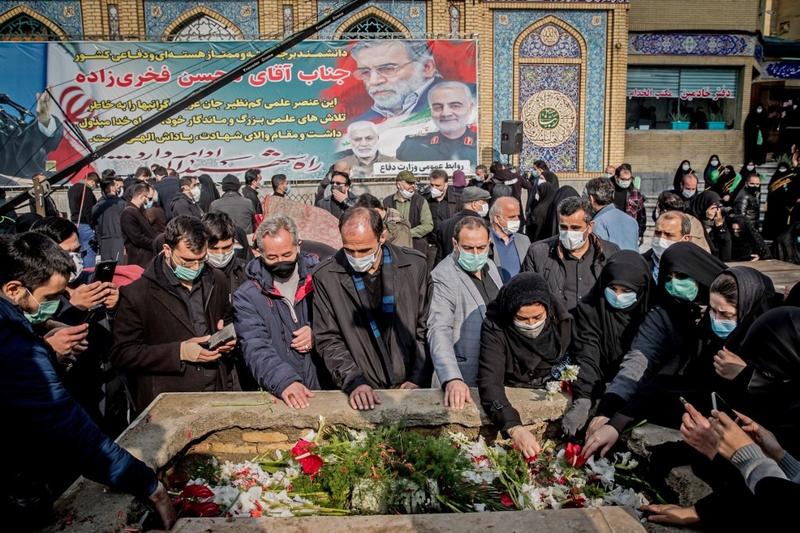 Iranian mourners attend the burial ceremony of slain nuclear scientist Mohsen Fakhrizadeh at Imamzadeh Saleh shrine in northern Tehran, on November 30, 2020. Iran said Israel and an exiled opposition group used new and "complex" methods to assassinate its leading nuclear scientist, as it buried him in a funeral befitting a top "martyr". (HAMED MALEKPOUR / TASNIM NEWS / AFP)
Iranian mourners attend the burial ceremony of slain nuclear scientist Mohsen Fakhrizadeh at Imamzadeh Saleh shrine in northern Tehran, on November 30, 2020. Iran said Israel and an exiled opposition group used new and "complex" methods to assassinate its leading nuclear scientist, as it buried him in a funeral befitting a top "martyr". (HAMED MALEKPOUR / TASNIM NEWS / AFP)
TEHRAN / DUBAI - A senior Iranian security official on Monday accused "Israel of being behind the recent assassination of top Iranian nuclear scientist Mohsen Fakhrizadeh," official IRNA news agency reported.
Ali Shamkhani, the secretary of Iran's Supreme National Security Council, said that "the operation of assassination was very complicated carried out by electronic devices," noting "no individual was present at the site."
Ali Shamkhani, the secretary of Iran's Supreme National Security Council, said that "the operation of assassination was very complicated carried out by electronic devices," noting "no individual was present at the site"
Earlier reports, however, said that the attackers first shot at Fakhrizadeh's vehicle, and then detonated a Nissan car loaded with explosives in Absard village, 60 km northeast of capital Tehran. Fakhrizadeh died of severe injuries in hospital on Friday afternoon.
Shamkhani also blamed the Iranian opposition group MKO for having "a role" in the assassination, saying that the "criminal element of this act is Israel and Mossad."
Shamkhani made the remarks at the funeral ceremony of Fakhrizadeh, where senior Iranian civil and military official participated.
READ MORE: Iran condemns nuke scientist's assassination, vows punishment
Iran’s English-language Press TV said on Monday that the weapon used in the killing of Fakhrizadeh was made in Israel.
“The weapon collected from the site of the terrorist act (where Mohsen Fakhrizadeh was assassinated) bears the logo and specifications of the Israeli military industry,” an unnamed source told Press TV.
Speaking before the Press TV report, Israeli intelligence minister Eli Cohen told radio station 103 FM on Monday that he did not know who was responsible.
The United Arab Emirates condemned the assassination of Fakhrizadeh, describing the attack as a “crime” that could increase tensions across the region.
The denunciation late Sunday was significant both because of the historically strained relations between Sunni Gulf Arab states and Shi'ite Iran, and the fact that Tehran has blamed the attack on Israel, which recently signed a normalization deal with the UAE.
ALSO READ: Tensions rise in Persian Gulf after Iran scientist assassinated
Cemetery
Iran began Fakhrizadeh’s burial at a cemetery in northern Tehran on Monday, state TV reported, as the defence minister promised the Islamic Republic would retaliate for his killing.
When asked about potential Iranian reprisals, Cohen told radio station 103: “We have regional intelligence supremacy, and on this matter we are prepared, we are increasing vigilance, in the places where that is required.”
Iran’s hardline Kayhan daily called for an attack on the Israeli port city of Haifa if an Israeli role in Fakhrizadeh’s killing is proven
Iran’s hardline Kayhan daily, whose editor-in-chief is named by Supreme Leader Ayatollah Ali Khamenei, in an opinion piece on Sunday called for an attack on the Israeli port city of Haifa, if an Israeli role in Fakhrizadeh’s killing is proven.
However, Iran’s rulers are aware of daunting military and political difficulties in attacking Israel. Such an attack would also complicate any effort by US President-elect Joe Biden to revive detente with Tehran after he takes office on Jan 20.
Tensions have increased between Tehran and Washington since 2018, when Trump exited Iran’s 2015 nuclear deal with six powers and reimposed sanctions that have crippled Iran’s economy.
In retaliation, Tehran gradually breached the deal’s curbs on its nuclear programme. Biden has said he will return the United States to the deal if Iran resumes compliance.
Tehran has always denied seeking nuclear weapons.
With inputs from Agencies


